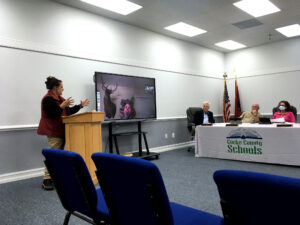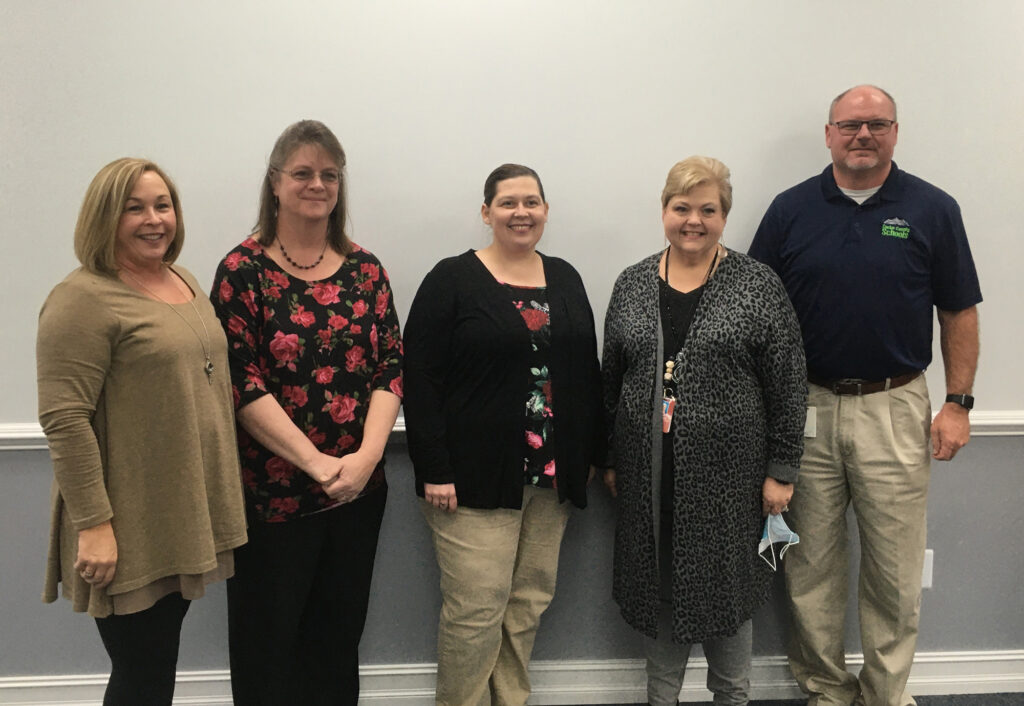
NEWPORT, Tenn.—An administrator from Cocke County High School addressed the Board of Education (BOE) on Thursday, to let them know she is in talks with Rep. Jeremy Faison to propose legislation that would integrate 10 “hybrid” learning days into the annual high school school calendar, in order to accommodate state testing.
Under present conditions, CCHS Curriculum Coordinator Nancy Brawley told the board that students are faced with interruptions, bell schedules and other distractions not conducive to testing for the End of Course (EOC) or ACT tests, which take several hours to complete.
“You have to interrupt the bell schedule, at this point, for four days, because ELA has two extended tests that are 85 minutes and 95 minutes,” she said, referring to the English Language Arts portions of EOC testing. “When you’re testing four blocks a day, you can only do two blocks a day, because you have to disrupt the bell schedule, which means you disrupt the lunch bell schedule. I mean it’s—it’s crazy, and that’s just to do ELA.”
She said it would be simpler if educators could have days when they bring only the students who are testing to campus, in order to establish a proper testing environment. She said she came to the conclusion to approach Faison about submitting a house bill, after discussions with the board, and with people versed in state law, who informed her that the code clearly states certain students can not be asked to stay home while others use the campus for testing.
She said students coming into the school who are not testing, and remaining on a bell schedule, can be disruptive. She cited other logistical barriers to successful test taking, such as testing rooms being adjacent to noisy cafeterias or gyms, which also improved testing during COVID, when students were distanced and allowed to test without the disruptions of daily school life.
“When we did EOC testing, when we were in COVID, we simply brought all the test takers into school that one day, and we did all ELA in one day, and all the math in one day, and it was all done in one great swoop,” she said. “I was like, ‘Well, can we not just do that again?’ Well, I can’t.”
At the meeting, Attendance Supervisor Dennis Balch clarified the law.
“It’s in the law that every student has to be in school for 180 days,” Balch said. “Any change to that calendar has to be approved by the state. In the law itself, it simply says that you can not have a student not attend school because of testing. That’s what she’s trying to address.”
Brawley said by utilizing remote learning to create 10 “hybrid days” per semester, she would be keeping students in school – and within state guidelines – by having teachers conduct their classrooms via Zoom, like they did during lockdown, to provide a more efficient testing environment. She said with effective use of technology, the lessons could be of the same quality as what the students are receiving in school.
She stated via text that she and other Cocke County educators are proposing to have test takers on campus no more than five days per semester, and that non test takers will have a remote assignment.
Because of strict State Department regulations, Brawley said rather than go ahead with their own schedule changes, and risk losing their license, she and her colleagues prefer to stay in compliance as they go through the proper channels and get a dedicated allowance for testing days, where students who are testing come to school, and others stay home.
She said one of the positive outcomes of COVID accommodations was remote learning. There was some additional discussion among herself and board members as to whether online learning, a capability that has come out of COVID restrictions, could supplement students who are not testing and are instead staying home on those days, but the consensus in the room was to get a more clear response from legislators, as well as a lasting solution.
“Cocke County is actually following the law because we can’t tell kids they can’t come to school,” she said. “Well, I want to argue that we’re not telling them that they can’t come to school. We’re just telling them they can’t come to school on campus. OK? But the state says that Mr. Moore doesn’t have the ability to grant that as like, a hybrid day.”
Brawley in her address was referring to Director of Schools Manney Moore, whose attendance at the meeting took place on a large screen via Zoom, as a precaution following COVID exposure. At several times during the meeting, Moore expressed support for her efforts.
“I guess I’ve come to the point where it has to be state legislative change in order for this to happen,” she said. “Everybody that I’ve talked to outside our district has been on board.”
She said she has been in correspondence with Faison and Sen. Steve Southerland. She said Faison told her that he would write a bill in her name, and have her speak at the 112th General Assembly, which convened Tuesday, and try to enact legislative change.
In other BOE news, Moore said COVID numbers are up. He said 12 staff and 60 students have now tested positive.
“The bad part of that is 49 of those students are this week, and nine staff,” he said. “That’s pretty high numbers, relatively speaking, from where we were, at times, in the fall.”
Speaking from a room with a taxidermy buck in the background, and fish mounted on the wall, Moore said following his own exposure, he is still feeling good, and testing negative.
The Cocke County COVID-19 Task Force met this week, according to Assistant Director of Schools Casey Kelley.
“Right now the hospital’s fully staffed,” he said. “There are 27 out of 27 beds, five out of five in ICU.”
Kelley said the school system watches the hospital with their task force as partners in the community, paying attention to the availability of medical services.
Moore said the Supreme Court blocked a temporary OSHA mandate requiring workers at businesses with 100 or more employees get vaccinated or submit a negative COVID test each week to enter the workplace. He said they had been advised via email that until further action by either the government or the court, there is no vaccine mandate for public schools.
The board agreed to meet with architects at a later date – either January 29 or February 5 – a 9 a.m. meeting to address building projects and use of ESSER third-round funds.
Three CCHS teachers were tenured and recognized for outstanding performance: Health Sciences teacher Darlene Shepherd, Deborah Livesay, who teaches Art and beautifies the school, and Amanda Marion, an AP Biology instructor who travels from Greeneville.

They were met with applause from the public and congratulations by the board.
On Tuesday, February 8, Kelley said there will be a school safety summit involving all department heads of all emergency response units, to discuss how to respond to random, specific incidents and explore relationships among first responders.
“All of our sheriff departments, fire departments, police, ambulance, hospital, road department—everybody that possibly could respond to an event that may happen at a school,” he said. “Each of you are invited.”
The group will decide on a hypothetical event, he said, citing examples such as an emergency happening at a building, a gas leak, or a chemical spill happening across a road near Edgemont Elementary School. He said plans could expand to include a live drill at a later date.
The event takes place at noon, lasts about three hours, and a luncheon will be provided by Smoky Mountain Home Health & Hospice. Kelley is asking that people reach out to him so he knows how many plan to attend.
This story appeared in The Newport Plain Talk.

